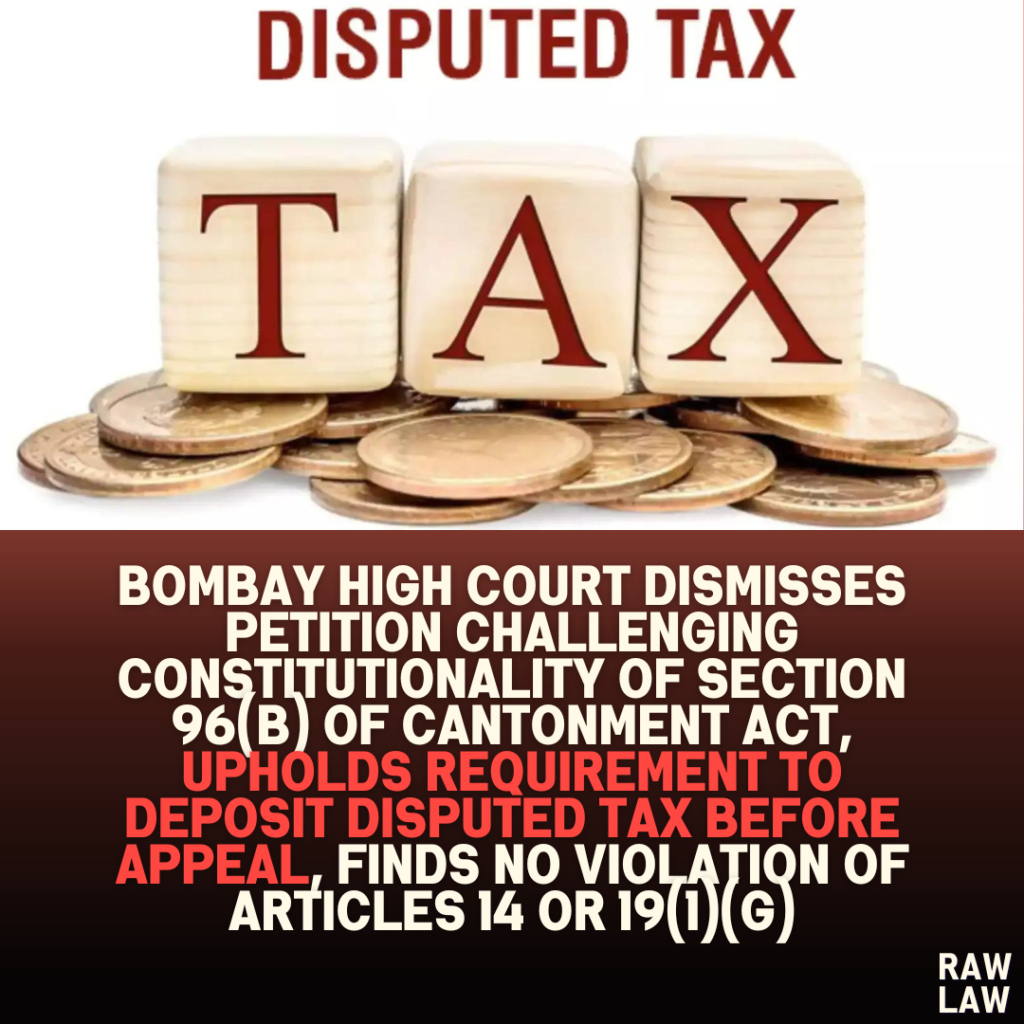Court’s Decision: The Bombay High Court dismissed the petition challenging the constitutionality of Section 96(b) of the Cantonment Act, 2006, which requires the disputed tax amount to be deposited before the appeal can be heard. The Court found no constitutional infirmity in the provision and ruled that it neither contravenes Article 14 (equality before law) nor imposes unreasonable restrictions under Article 19(1)(g) (right to carry on business). The petition was dismissed without costs.
Facts: The petitioner, who operates a shopping mall within the Pune Cantonment Board’s jurisdiction, challenged the tax demands for the triennial 2011-2014. They sought to quash the provisional bills and demand notices issued under the Cantonment Act and to declare Section 96(b) unconstitutional. They argued that this provision placed an unreasonable restriction on the right to appeal, as it mandates the full deposit of the disputed tax amount before the appeal can be heard.
Issues:
- Whether Section 96(b) of the Cantonment Act, 2006, violates Articles 14 and 19(1)(g) of the Constitution.
- Whether the imposition of the condition to deposit the full disputed tax amount before the appeal hearing was an unreasonable restriction.
Petitioner’s Arguments: The petitioner argued that Section 96(b) of the Cantonment Act, 2006, was unconstitutional because it required the deposit of the disputed tax amount as a precondition for filing an appeal. They claimed that this provision imposed an unreasonable burden, particularly when taxes were allegedly assessed arbitrarily and unreasonably. They further contended that this violated their right to equality under Article 14 and imposed unreasonable restrictions on their business under Article 19(1)(g).
Respondent’s Arguments: The respondents, represented by the Pune Cantonment Board, argued that the provision under Section 96(b) was identical to earlier laws upheld by the Supreme Court, specifically Section 87(b) of the Cantonments Act, 1924. They maintained that the constitutional validity of similar provisions had been previously upheld in various judgments, and there was no reason to revisit these established principles.
Analysis of the Law: The Court examined the precedents relating to Section 96(b) and similar provisions in other statutes, noting that the Supreme Court had previously upheld the constitutionality of these provisions. It also emphasized that the right to appeal is statutory and may be subject to conditions imposed by the legislature. The Court held that the provision in question does not infringe on the petitioner’s fundamental rights, as the requirement to deposit disputed taxes before the hearing of an appeal is not an unreasonable restriction.
Precedent Analysis: The Court relied on several precedents, including the Supreme Court’s decision in St. Mary’s School v. Cantonment Board, which upheld the validity of similar provisions. The Court noted that the arguments presented in this case had already been rejected by the Supreme Court in various rulings, emphasizing that the right to appeal can be conditional.
Court’s Reasoning: The Bombay High Court reasoned that there was no constitutional infirmity in requiring the deposit of disputed taxes before an appeal is heard. The provision was deemed reasonable and consistent with other similar laws that had been upheld. The Court also found that the petitioner had failed to provide any credible data to substantiate claims that the taxes were assessed arbitrarily.
Conclusion: The petition was dismissed, and the Court held that Section 96(b) of the Cantonment Act, 2006, is constitutionally valid. The petitioner’s challenge to the tax demand was also dismissed, and no costs were awarded.
Implications: This judgment reinforces the principle that statutory provisions requiring the deposit of disputed amounts before filing an appeal are constitutionally valid. It emphasizes that such conditions do not violate fundamental rights and legislatures can impose reasonable conditions on the right to appeal. The case also highlights the deference courts must show to legislative judgment, particularly in matters of taxation and economic policy.
